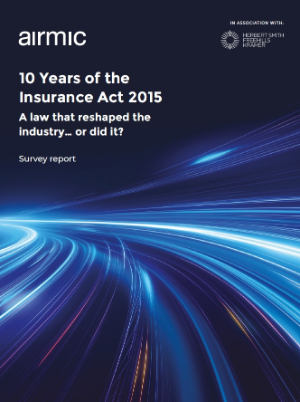- within Insurance topic(s)
- with Senior Company Executives and HR
- in European Union
- with readers working within the Insurance industries
This year marks the 10-year anniversary of the Insurance Act 2015 (the Act) receiving royal assent, which paved the way for the most significant reform in insurance law in the UK in over 100 years.
To mark the anniversary and to see what impact the Act has had on both the placement of policies and the handling of claims from the policyholder perspective, we worked with Airmic on a survey of risk managers to see what impact the Act has had on policyholders. The full results of the survey can be found by clicking the report below.
KEY FINDINGS
- The Act appears to have had a largely positive impact. 64% of survey respondents thought that the impact of the Act had been positive, and 85% reported no change in the number of disputes with insurers since the introduction of the Act.
- However, policyholders should continue to be mindful, particularly when negotiating policy wordings, to ensure that conditions precedent and warranties are kept to a minimum and are clearly drafted and labelled.
DUTY OF FAIR PRESENTATION
The biggest impact of the Act appears to have been in relation to pre-contract disclosure, following the introduction of the new duty of fair presentation. 60% of survey respondents said that the Act has altered the way they approach disclosure, and this has resulted in greater engagement with insurers according to over half of respondents (52%).
Under the Act, an insured is required to:
- disclose every material circumstance which the insured knows or ought to know, or
- failing that, give their insurer sufficient information to put a prudent insurer on notice to make further enquiries
- present the information in a reasonably clear manner that is accessible to a prudent insurer.
The Act also sets out how to ascertain the insured's knowledge for these purposes:
- An insured is taken to "know" what is known to the insured's senior management and individuals responsible for the insured's insurance (which encompasses risk managers and any employee who assists in the collection of data or negotiates the terms of the insurance). In this regard, 69% of survey respondents had agreed with insurers whose actual knowledge is relevant for the duty of fair presentation.
- An insured "ought to know" what would have been revealed by a reasonable search of information available to the insured. 65% of survey respondents had discussed what constitutes a "reasonable search" with their insurers.
The Act introduced a range of proportionate remedies in the event of a breach of the new duty. Under the Act, unless the breach is deliberate or reckless (in which case the remedy of avoidance is still available), the onus is on the insurer to show what it would have done had it received a fair presentation of the risk:
- the insurer will still be entitled to avoid the policy if it can show that had it received a fair presentation of the risk, it would not have entered into the contract (but it must return the premium); but
- if the insurer shows that it would have entered into the contract but on different terms, then the insurer may treat the policy as having included those different terms from the outset. This could result in the addition of warranties or exclusions which could affect the recoverability of claims; or
- if the insurer would have entered into the contract but only at a higher premium, the insurer may reduce the amount to be paid on a claim proportionately.
We were pleased to see that none of the survey respondents had experienced insurers seeking to prove that a breach of the Duty of Fair Presentation was deliberate/reckless to enable them to avoid the Policy.
What the insurer would have done has been the subject of two reported cases, which we have written about previously: Berkshire Assets (West London) Ltd v AXA Insurance UK Plc [2021] EWHC 2689 (Comm) and Tynefield Care Ltd v The New India Assurance Company [2024]. In both cases, insurers were able to prove that they would not have written the policy had they known about the matters which were not disclosed.
POLICY WORDINGS
In relation to policy wordings, the Act:
Abolished basis clauses
- A basis clause is a declaration (contained either in a proposal form or policy wording) that certain representations made by the insured are true and accurate. By operation of the basis clause, this declaration was incorporated into the policy as a warranty, which meant that any inaccuracy in the information provided by the insured would be a breach of warranty and the insurer would be discharged from any liability from the date of breach.
Made warranties 'suspensive conditions'
- This means that in the event of a breach of warranty, the Act provides that the insurer's liability is suspended during the time the insured is in breach but can be restored if the breach is remedied. This contrasts with the 'all or nothing' approach of the old law, where breach of warranty automatically discharged an insurer's liability even if the breach was trivial or did not relate to the insured's loss in any way.
Introduced a new provision at section 11
- Section 11 of the Act prevents the insurer from relying on breach of a term by the insured if the breach could not have increased the risk of loss in the circumstances in which that loss occurred. This applies to breaches of warranties and other terms which would tend to reduce the risk of loss of a particular kind or loss at a particular location or time but not to terms which define the risk as a whole. To date, the only judgment to have considered Section 11 is MOK Petro Energy v Argo (No. 604) Limited (The "F1") [2024] EWHC 1935 (Comm).
There were concerns that the changes introduced by the Act might lead Insurers to look to other means of protecting their positions, and indeed:
- 23% of survey respondents said that they had experienced insurers seeking to introduce sweep-up clauses (clauses which provide that all obligations on the insured in the policy are conditions precedent to the insurers' liability) to their policies, and
- 22% of survey respondents had experienced insurers seeking to add more conditions precedent to their policies since the introduction of the Act.
On the other hand, less than 10% of survey respondents had experienced insurers seeking to contract out of the Act altogether.
CLAIMS HANDLING
Prior to the Act coming into force, there was concern that it might mean insurers would be more likely to challenge claims. Over 50% of respondents in a survey we conducted with Airmic in 2015 agreed with this sentiment. Interestingly, this has proved not to be the case according to our latest 2025 survey in which over 70% of respondents said they had not found insurers were more inclined to challenge claims or there had been no change.
Section 13A of the Act implies into every policy a term that insurers must pay claims within a reasonable time. This introduced a new right for policyholders to claim damages in the event of late payment of a claim. Whilst some parts of the insurance market report anecdotally that policyholders are exercising their right to claim damages for late payment as a matter of course, this is not backed up by the results of the survey in which only 2% of respondents said that they had ever demanded damages for late payment. To date, just two cases have considered section 13A of the Act which implies into every insurance contract a term that insurers must pay claims within a reasonable time: Quadra Commodities S.A. v XL Insurance Company SE [2022] EWHC 431 (Comm) and Delos Shipholding SA & Ors v Allianz Global Corporate and Speciality SE [2024] EWHC 719 (Comm). In both cases, the policyholder was not successful in claiming damages for late payment of its claim.
The content of this article is intended to provide a general guide to the subject matter. Specialist advice should be sought about your specific circumstances.





